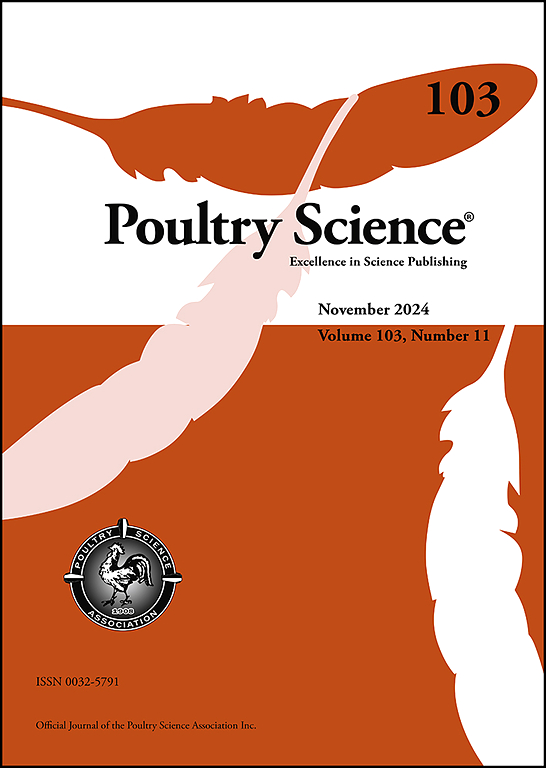商业蛋鸡养殖场的粪便气味分析:疫苗接种事件作为模型压力源。
IF 3.8
1区 农林科学
Q1 AGRICULTURE, DAIRY & ANIMAL SCIENCE
引用次数: 0
摘要
目前在家禽中缺乏持续、非侵入性和客观的方法来检测家禽对应激源的反应,包括肠道健康偏差。这项原理证明研究探讨了粪便气味分析在监测Lohmann Brown Classic、Lohmann LSL Classic和Lohmann LSL Lite蛋鸡应激反应中的潜力。压力源由3周龄雏鸡接种沙门氏菌疫苗(数据集1和数据集2)和16周龄雏鸡接种沙门氏菌疫苗(数据集4)以及12周龄雏鸡接种病毒/细菌混合疫苗(数据集3)来表示。从接种疫苗前2天到接种疫苗后4天,每天采集新鲜粪便样本,每个数据集每天收集4个粪便样本。将粪便挥发物浓缩到不锈钢吸附管中,采用热脱附和气相色谱-质谱联用系统进行分析。接种前,数据集、品种和样本位置对粪便挥发性特征没有影响。年龄确实会影响粪便挥发性特征,幼崽的-樟脑、(Z)-6-三烯和丝氨酸醇峰值强度升高,而老年幼崽的羰基硫化物和三甲胺峰值强度升高。沙门氏菌接种3周龄导致挥发性峰值强度变化最一致。在数据集1、数据集3和数据集4中,接种沙门氏菌疫苗或病毒/细菌混合疫苗后,(Z)-6-三烯减少,尽管母鸡年龄和饲养环境不同。与口服沙门氏菌疫苗相比,注射病毒/细菌混合疫苗在粪便挥发性谱上产生了更明显的随时间变化。12周和16周。在所有数据集之间没有发现上调或下调挥发物的重叠趋势。综上所述,作为应激源的代理,接种疫苗会影响饲养母鸡粪便的挥发性特征,而反应的大小和方向取决于接种疫苗时雏鸡的年龄、接种方法和疫苗的致病特性。接种疫苗后,4个鸡群中有3个的挥发物峰值强度降低,这表明粪便气味分析在监测蛋鸡应激反应方面具有潜力。本文章由计算机程序翻译,如有差异,请以英文原文为准。
Manure odor profiling for flock-level monitoring on commercial layer pullet farms: Vaccination events as a model stressor
Continuous, non-invasive, and objective methods to detect flock-level responses to stressors, including intestinal health deviations, are currently lacking in poultry. This proof of principle study investigated the potential of manure odor profiling in monitoring stress responses in Lohmann Brown Classic, Lohmann LSL Classic and Lohmann LSL Lite layer pullets. Stressors were represented by a Salmonella vaccination given to the pullets at wk 3 of age (Dataset 1 and Dataset 2) and wk 16 of age (Dataset 4) and a viral/bacterial vaccine cocktail given at wk 12 of age (Dataset 3). Fresh manure was sampled daily, from 2 days before vaccination to 4 days after vaccination, with 4 pooled manure samples per day per dataset. Manure volatiles were concentrated into stainless steel sorbent tubes and analyzed by a thermal desorption system coupled with gas chromatography-mass spectrometry. Dataset, breed and sample location did not affect the manure volatile profiles before vaccination. Age did affect the manure volatile profiles, with beta-camphor, (Z)-6-Tridecene and serinol peak intensities elevated in young pullets and carbonyl sulfide and trimethylamine elevated in older pullets. Salmonella vaccination at wk 3 of age led to the most consistent changes in volatile peak intensities. (Z)-6-Tridecene was decreased in Dataset 1, Dataset 3, and Dataset 4 after either the Salmonella vaccination or the viral/bacterial vaccine cocktail, despite differences in hen age and house. The injected viral/bacterial vaccine cocktail created a more clear time-dependent shift in the manure volatile profile than the orally-provided Salmonella vaccination in older pullets at resp. wk 12 and 16 of age. No overlapping trends in upregulated or downregulated volatiles were found between all datasets. To conclude, volatile profiles of rearing hen manure are affected by vaccinations as a proxy for stressors, and the magnitude and direction of the response depends on the age of the pullets at vaccination, the vaccination method, and the pathogenic properties of the vaccine. The reduced peak intensities of volatiles after vaccination in 3 out of 4 flocks suggests the potential of manure odor profiling in monitoring stress responses in layer pullets.
求助全文
通过发布文献求助,成功后即可免费获取论文全文。
去求助
来源期刊

Poultry Science
农林科学-奶制品与动物科学
CiteScore
7.60
自引率
15.90%
发文量
0
审稿时长
94 days
期刊介绍:
First self-published in 1921, Poultry Science is an internationally renowned monthly journal, known as the authoritative source for a broad range of poultry information and high-caliber research. The journal plays a pivotal role in the dissemination of preeminent poultry-related knowledge across all disciplines. As of January 2020, Poultry Science will become an Open Access journal with no subscription charges, meaning authors who publish here can make their research immediately, permanently, and freely accessible worldwide while retaining copyright to their work. Papers submitted for publication after October 1, 2019 will be published as Open Access papers.
An international journal, Poultry Science publishes original papers, research notes, symposium papers, and reviews of basic science as applied to poultry. This authoritative source of poultry information is consistently ranked by ISI Impact Factor as one of the top 10 agriculture, dairy and animal science journals to deliver high-caliber research. Currently it is the highest-ranked (by Impact Factor and Eigenfactor) journal dedicated to publishing poultry research. Subject areas include breeding, genetics, education, production, management, environment, health, behavior, welfare, immunology, molecular biology, metabolism, nutrition, physiology, reproduction, processing, and products.
 求助内容:
求助内容: 应助结果提醒方式:
应助结果提醒方式:


